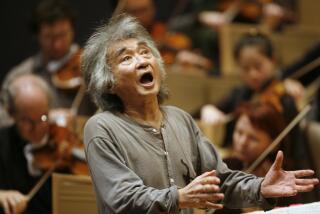Ninth Symphony--in German--a Choral Favorite : Japan Hits Joyous Note With Beethoven
TOKYO — Fishmongers do it, accountants do it, even geishas in a Tokyo teahouse district do it: They wind up the year by singing Beet-hoven’s Ninth Symphony. What’s more, they do it in German.
Japan’s December choral symphony boom has reached new heights this year. Nearly 10,000 people sang along with a 200-member orchestra in Osaka to kick off the season Dec. 1, while about 4,000 singers are expected to gather at Tokyo’s sumo wrestling stadium for a nationally televised performance at midnight New Year’s Eve.
“Two members of my camera crew sang the Ninth in university and I plan to show them on screen, singing in German together with the choir, during the telecast,” said Takayoshi Satoh, producer of Nippon Television’s year-end program.
Though no one is quite sure how the custom of closing the old year with Beethoven began, the number of year-end concerts is increasing. Records show 19 performances in 1962, 49 by 1977 and 103 in 1982. This December, an estimated 200,000 Japanese will take part in about 150 concerts featuring nothing but the Ninth Symphony.
Although many Japanese delight in analyzing their cultural behavior, there appear to be no simple answers as to why Beethoven’s Ninth, why always at the end of the year and why in German. The custom, which appears to have started immediately after World War II, is seen by some as a symbol of their nation’s rising from the ashes of defeat, by others as an example of a local love of festivals and by yet others as the murdering of a great piece of music.
Junichi Yano, a writer on cultural affairs, traced the boom to three Beethoven Ninth concerts in 1947, shortly after Japan’s defeat in World War II. “In those days, people had hardly enough to eat,” Yano said. “The audience must have felt the chill in their bones, and then, in a shabby hall in the middle of a bombed-out city, they heard this incredibly happy sound written by a man who could not hear.”
Beethoven borrowed Schiller’s “Ode to Joy” for the lyrics of the final thunderous movement of his work.
“There was no way those people could not have been encouraged by the example of a man who overcame his difficulties,” Yano said. “They too must have felt that beyond anguish there is joy.”
Another suggestion is that Japanese have taken to the Ninth because it was Beethoven’s last major work and December is the last month of the year. Simple as this may sound, the fact is that December in Japan is a month of lasts. It is when all bills must be paid, when houses must be cleaned and when ceremonial ropes are tacked onto doors and gates to show that the year has been closed.
But no matter what the reason, few who have come in contact with Japanese Beethoven cultists have failed to be impressed by their energy and dedication.
‘It Turns You On’
“They go on with such fervor it turns you on,” said Victor Feldbrill, a former conductor of the Toronto Symphony, who today teaches at Japan’s equivalent of a national conservatory. Until coming to Japan in 1983, Feldbrill had conducted the Ninth six times in a 31-year professional career. In the last three Decembers, he has done the piece 16 times.
One of the centers of Japan’s year-end Beethoven cult is Tokyo’s sumo wrestling stadium, the scene of the live telecast scheduled for New Year’s Eve. Sumida ward, which overlooks the stadium, is the site of 12 night classes in public buildings, all devoted to the study of nothing but one 10-minute passage in the last movement of the symphony.
Earlier this year, 35 geishas from a nearby teahouse district learned to sing the Ninth for the opening ceremonies of the stadium.
According to Akie Takeuchi, an accountant at a computer firm and a member of the ward’s Sumida Joy Choir, the difficulty of the German words is part of the challenge. “I know choir members who sing the Ninth to themselves on train platforms on their way to work, or who get together to coach each other at coffee shops.”
Koji Akutsu, a fish wholesaler, borrowed his son’s Sony Walkman to play special pronunciation tapes he bought from a choir so that he could listen to his part even during work. “I don’t think I’ll ever get it right, but I was so touched by how hard everyone else was trying, I just cannot quit,” he said.
Taped Accompaniment
The launching this year of a “sing-along with Beethoven’s Ninth” tape for choirs that cannot afford to practice with orchestras drew fire from professional musicians.
“There is very little creativity involved in leading a group following a recording,” said one conductor.
As for Kenichiro Tokunaga, first-chair cellist of Japan’s national broadcasting orchestra, even live performances of the Ninth are a bother. “There is something silly about having to play the same piece all the time,” he said.
But Koichi Sugiyama, one of Japan’s leading composers, said he cannot get enough of Beethoven in December. “Before the Beethoven boom, all I ever heard at this time of the year was ‘Jingle Bells.’ I think the Ninth is preferable to ‘Jingle Bells’ no matter how often you have to listen to it.”
More to Read
The biggest entertainment stories
Get our big stories about Hollywood, film, television, music, arts, culture and more right in your inbox as soon as they publish.
You may occasionally receive promotional content from the Los Angeles Times.










